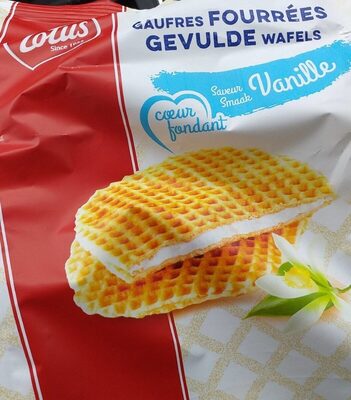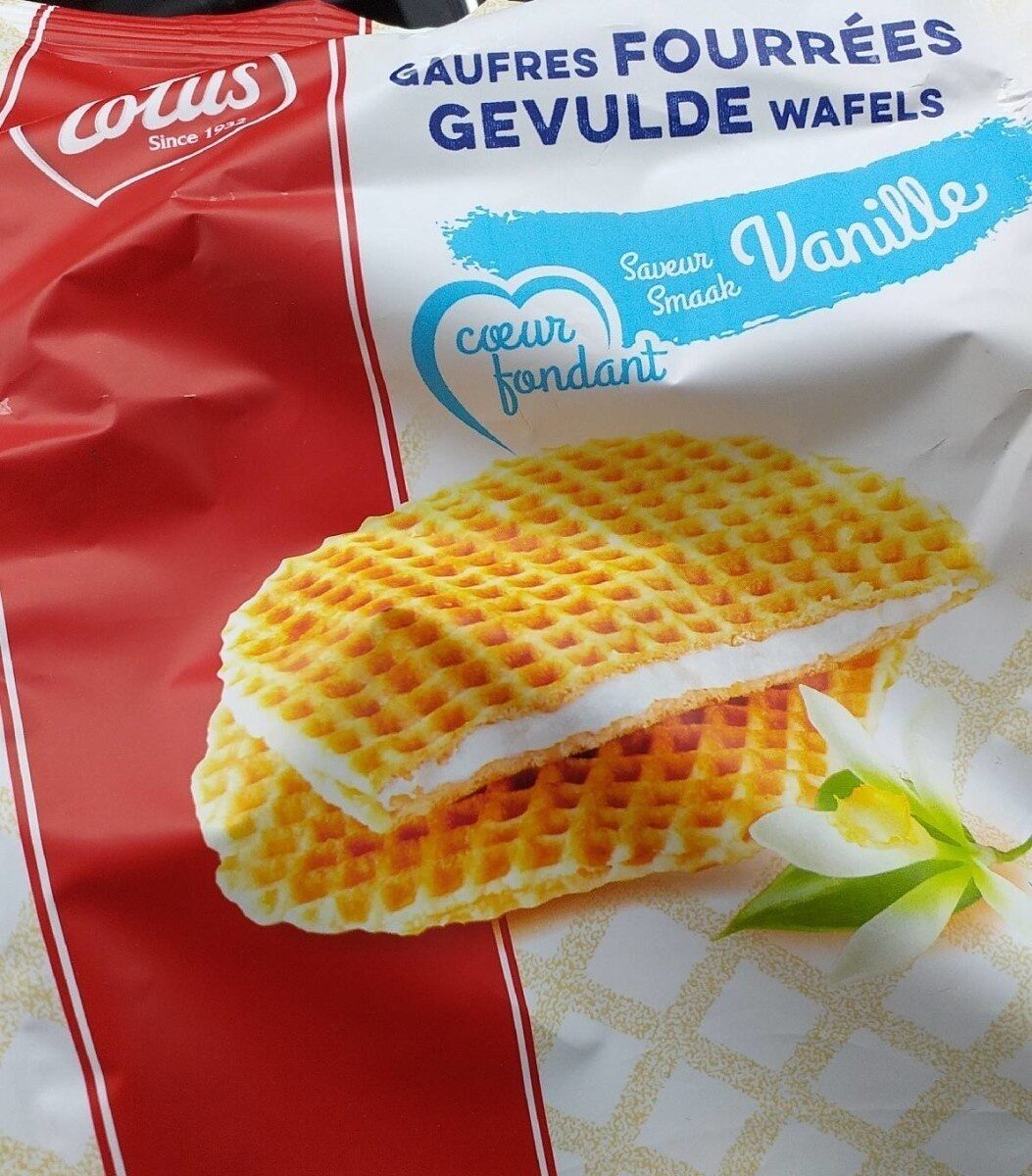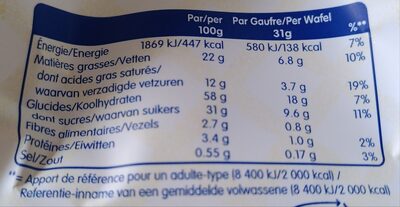Help us make food transparency the norm!
As a non-profit organization, we depend on your donations to continue informing consumers around the world about what they eat.
The food revolution starts with you!
Gaufres fourrées Saveur Vanille - Lotus - 310 g
Gaufres fourrées Saveur Vanille - Lotus - 310 g
This product page is not complete. You can help to complete it by editing it and adding more data from the photos we have, or by taking more photos using the app for Android or iPhone/iPad. Thank you!
×
Barcode: 3215061072737 (EAN / EAN-13)
Common name: Gaufres fourrées à la vanille - Gaufres saveur Vanille
Quantity: 310 g
Brands: Lotus
Categories: Snacks, Sweet snacks, Biscuits and cakes, Pastries, Waffles, Stuffed waffles
Labels, certifications, awards: Huile de palme durable, Point Vert
Link to the product page on the official site of the producer: https://www.lotusbakeries.fr/
Stores: Magasins U, Delhaize, carrefour.fr
Matching with your preferences
Health
Ingredients
-
23 ingredients
wheat flour, vegetable oils (palm, rapeseed), dextrose, sugar, glucose syrup - fructose, wheat starch, ground-raised hen eggs, wheat fibre, salt, yeast, aroma, emulsifiers (mono - and fatty acid diglycerides, sodium stearoyl-lactylate, soy lecithin), preservative (potassium sorbate), acidic corrector (citric acid), a sustainable and certified plantationAllergens: Eggs, Gluten, Soybeans
Food processing
-
Ultra processed foods
Elements that indicate the product is in the 4 - Ultra processed food and drink products group:
- Additive: E322 - Lecithins
- Additive: E471 - Mono- and diglycerides of fatty acids
- Additive: E481 - Sodium stearoyl-2-lactylate
- Ingredient: Dextrose
- Ingredient: Emulsifier
- Ingredient: Flavouring
- Ingredient: Glucose
Food products are classified into 4 groups according to their degree of processing:
- Unprocessed or minimally processed foods
- Processed culinary ingredients
- Processed foods
- Ultra processed foods
The determination of the group is based on the category of the product and on the ingredients it contains.
Additives
-
E1103 - Invertase
Invertase: Invertase is an enzyme that catalyzes the hydrolysis -breakdown- of sucrose -table sugar- into fructose and glucose. Alternative names for invertase include EC 3.2.1.26, saccharase, glucosucrase, beta-h-fructosidase, beta-fructosidase, invertin, sucrase, maxinvert L 1000, fructosylinvertase, alkaline invertase, acid invertase, and the systematic name: beta-fructofuranosidase. The resulting mixture of fructose and glucose is called inverted sugar syrup. Related to invertases are sucrases. Invertases and sucrases hydrolyze sucrose to give the same mixture of glucose and fructose. Invertases cleave the O-C-fructose- bond, whereas the sucrases cleave the O-C-glucose- bond.For industrial use, invertase is usually derived from yeast. It is also synthesized by bees, which use it to make honey from nectar. Optimal temperature at which the rate of reaction is at its greatest is 60 °C and an optimum pH of 4.5. Typically, sugar is inverted with sulfuric acid.Source: Wikipedia
-
E202 - Potassium sorbate
Potassium sorbate (E202) is a synthetic food preservative commonly used to extend the shelf life of various food products.
It works by inhibiting the growth of molds, yeast, and some bacteria, preventing spoilage. When added to foods, it helps maintain their freshness and quality.
Some studies have shown that when combined with nitrites, potassium sorbate have genotoxic activity in vitro. However, potassium sorbate is generally recognized as safe (GRAS) by regulatory authorities.
-
E322 - Lecithins
Lecithins are natural compounds commonly used in the food industry as emulsifiers and stabilizers.
Extracted from sources like soybeans and eggs, lecithins consist of phospholipids that enhance the mixing of oil and water, ensuring smooth textures in various products like chocolates, dressings, and baked goods.
They do not present any known health risks.
-
E322i - Lecithin
Lecithins are natural compounds commonly used in the food industry as emulsifiers and stabilizers.
Extracted from sources like soybeans and eggs, lecithins consist of phospholipids that enhance the mixing of oil and water, ensuring smooth textures in various products like chocolates, dressings, and baked goods.
They do not present any known health risks.
-
E330 - Citric acid
Citric acid is a natural organic acid found in citrus fruits such as lemons, oranges, and limes.
It is widely used in the food industry as a flavor enhancer, acidulant, and preservative due to its tart and refreshing taste.
Citric acid is safe for consumption when used in moderation and is considered a generally recognized as safe (GRAS) food additive by regulatory agencies worldwide.
-
E471 - Mono- and diglycerides of fatty acids
Mono- and diglycerides of fatty acids (E471), are food additives commonly used as emulsifiers in various processed foods.
These compounds consist of glycerol molecules linked to one or two fatty acid chains, which help stabilize and blend water and oil-based ingredients. E471 enhances the texture and shelf life of products like margarine, baked goods, and ice cream, ensuring a smooth and consistent texture.
It is generally considered safe for consumption within established regulatory limits.
-
E481 - Sodium stearoyl-2-lactylate
Sodium stearoyl lactylate: Sodium stearoyl-2-lactylate -sodium stearoyl lactylate or SSL- is a versatile, FDA approved food additive used to improve the mix tolerance and volume of processed foods. It is one type of a commercially available lactylate. SSL is non-toxic, biodegradable, and typically manufactured using biorenewable feedstocks. Because SSL is a safe and highly effective food additive, it is used in a wide variety of products ranging from baked goods and desserts to pet foods.As described by the Food Chemicals Codex 7th edition, SSL is a cream-colored powder or brittle solid. SSL is currently manufactured by the esterification of stearic acid with lactic acid and partially neutralized with either food-grade soda ash -sodium carbonate- or caustic soda -concentrated sodium hydroxide-. Commercial grade SSL is a mixture of sodium salts of stearoyl lactylic acids and minor proportions of other sodium salts of related acids. The HLB for SSL is 10-12. SSL is slightly hygroscopic, soluble in ethanol and in hot oil or fat, and dispersible in warm water. These properties are the reason that SSL is an excellent emulsifier for fat-in-water emulsions and can also function as a humectant.Source: Wikipedia
Ingredients analysis
-
Palm oil
Ingredients that contain palm oil: Palm oil
-
Non-vegan
Non-vegan ingredients: Barn eggsSome ingredients could not be recognized.
We need your help!
You can help us recognize more ingredients and better analyze the list of ingredients for this product and others:
- Edit this product page to correct spelling mistakes in the ingredients list, and/or to remove ingredients in other languages and sentences that are not related to the ingredients.
- Add new entries, synonyms or translations to our multilingual lists of ingredients, ingredient processing methods, and labels.
If you would like to help, join the #ingredients channel on our Slack discussion space and/or learn about ingredients analysis on our wiki. Thank you!
-
Vegetarian status unknown
Unrecognized ingredients: fr:issue-de-plantations-durables-et-certifieesSome ingredients could not be recognized.
We need your help!
You can help us recognize more ingredients and better analyze the list of ingredients for this product and others:
- Edit this product page to correct spelling mistakes in the ingredients list, and/or to remove ingredients in other languages and sentences that are not related to the ingredients.
- Add new entries, synonyms or translations to our multilingual lists of ingredients, ingredient processing methods, and labels.
If you would like to help, join the #ingredients channel on our Slack discussion space and/or learn about ingredients analysis on our wiki. Thank you!
-
Details of the analysis of the ingredients
We need your help!
Some ingredients could not be recognized.
We need your help!
You can help us recognize more ingredients and better analyze the list of ingredients for this product and others:
- Edit this product page to correct spelling mistakes in the ingredients list, and/or to remove ingredients in other languages and sentences that are not related to the ingredients.
- Add new entries, synonyms or translations to our multilingual lists of ingredients, ingredient processing methods, and labels.
If you would like to help, join the #ingredients channel on our Slack discussion space and/or learn about ingredients analysis on our wiki. Thank you!
fr: Farine de blé, huiles végétales de palme, huiles végétales de colza, dextrose, sucre, sirop de glucose-fructose, amidon de blé, œufs de poules élevées au sol, fibres de blé, sel, levure, arôme, émulsifiants (mono- et diglycérides d'acides gras, stearoyl-2-lactylate de sodium, lécithine de soja), conservateur (sorbate de potassium), correcteur d'acidité (acide citrique), stabilisant (invertase), issue de plantations durables et certifiées- Farine de blé -> en:wheat-flour - vegan: yes - vegetarian: yes - ciqual_proxy_food_code: 9410 - percent_min: 5.88235294117647 - percent_max: 100
- huiles végétales de palme -> en:palm-oil - vegan: yes - vegetarian: yes - from_palm_oil: yes - ciqual_food_code: 16129 - percent_min: 0 - percent_max: 50
- huiles végétales de colza -> en:colza-oil - vegan: yes - vegetarian: yes - from_palm_oil: no - ciqual_food_code: 17130 - percent_min: 0 - percent_max: 33.3333333333333
- dextrose -> en:dextrose - vegan: yes - vegetarian: yes - ciqual_proxy_food_code: 31016 - percent_min: 0 - percent_max: 25
- sucre -> en:sugar - vegan: yes - vegetarian: yes - ciqual_proxy_food_code: 31016 - percent_min: 0 - percent_max: 20
- sirop de glucose-fructose -> en:glucose-fructose-syrup - vegan: yes - vegetarian: yes - ciqual_food_code: 31077 - percent_min: 0 - percent_max: 16.6666666666667
- amidon de blé -> en:wheat-starch - vegan: yes - vegetarian: yes - ciqual_proxy_food_code: 9510 - percent_min: 0 - percent_max: 14.2857142857143
- œufs de poules élevées au sol -> en:barn-eggs - vegan: no - vegetarian: yes - ciqual_food_code: 22000 - percent_min: 0 - percent_max: 12.5
- fibres de blé -> en:wheat-fiber - vegan: yes - vegetarian: yes - percent_min: 0 - percent_max: 11.1111111111111
- sel -> en:salt - vegan: yes - vegetarian: yes - ciqual_food_code: 11058 - percent_min: 0 - percent_max: 0.548
- levure -> en:yeast - vegan: yes - vegetarian: yes - ciqual_proxy_food_code: 11009 - percent_min: 0 - percent_max: 0.548
- arôme -> en:flavouring - vegan: maybe - vegetarian: maybe - percent_min: 0 - percent_max: 0.548
- émulsifiants -> en:emulsifier - percent_min: 0 - percent_max: 0.548
- mono- et diglycérides d'acides gras -> en:e471 - vegan: maybe - vegetarian: maybe - from_palm_oil: maybe - percent_min: 0 - percent_max: 0.548
- stearoyl-2-lactylate de sodium -> en:e481 - vegan: maybe - vegetarian: maybe - from_palm_oil: maybe - percent_min: 0 - percent_max: 0.274
- lécithine de soja -> en:soya-lecithin - vegan: yes - vegetarian: yes - ciqual_food_code: 42200 - percent_min: 0 - percent_max: 0.182666666666667
- conservateur -> en:preservative - percent_min: 0 - percent_max: 0.548
- sorbate de potassium -> en:e202 - vegan: yes - vegetarian: yes - percent_min: 0 - percent_max: 0.548
- correcteur d'acidité -> en:acidity-regulator - percent_min: 0 - percent_max: 0.548
- acide citrique -> en:e330 - vegan: yes - vegetarian: yes - percent_min: 0 - percent_max: 0.548
- stabilisant -> en:stabiliser - percent_min: 0 - percent_max: 0.548
- invertase -> en:e1103 - vegan: yes - vegetarian: yes - percent_min: 0 - percent_max: 0.548
- issue de plantations durables et certifiées -> fr:issue-de-plantations-durables-et-certifiees - percent_min: 0 - percent_max: 0.548
Nutrition
-
Bad nutritional quality
⚠ ️Warning: the amount of fruits, vegetables and nuts is not specified on the label, it was estimated from the list of ingredients: 11This product is not considered a beverage for the calculation of the Nutri-Score.
Positive points: 2
- Proteins: 2 / 5 (value: 3.23, rounded value: 3.23)
- Fiber: 2 / 5 (value: 2.58, rounded value: 2.58)
- Fruits, vegetables, nuts, and colza/walnut/olive oils: 0 / 5 (value: 11.7647058823529, rounded value: 11.8)
Negative points: 23
- Energy: 5 / 10 (value: 1870, rounded value: 1870)
- Sugars: 6 / 10 (value: 31, rounded value: 31)
- Saturated fat: 10 / 10 (value: 11.9, rounded value: 11.9)
- Sodium: 2 / 10 (value: 219, rounded value: 219)
The points for proteins are not counted because the negative points are greater or equal to 11.
Nutritional score: (23 - 2)
Nutri-Score:
-
Nutrient levels
-
Fat in high quantity (21.9%)
What you need to know- A high consumption of fat, especially saturated fats, can raise cholesterol, which increases the risk of heart diseases.
Recommendation: Limit the consumption of fat and saturated fat- Choose products with lower fat and saturated fat content.
-
Saturated fat in high quantity (11.9%)
What you need to know- A high consumption of fat, especially saturated fats, can raise cholesterol, which increases the risk of heart diseases.
Recommendation: Limit the consumption of fat and saturated fat- Choose products with lower fat and saturated fat content.
-
Sugars in high quantity (31%)
What you need to know- A high consumption of sugar can cause weight gain and tooth decay. It also augments the risk of type 2 diabetes and cardio-vascular diseases.
Recommendation: Limit the consumption of sugar and sugary drinks- Sugary drinks (such as sodas, fruit beverages, and fruit juices and nectars) should be limited as much as possible (no more than 1 glass a day).
- Choose products with lower sugar content and reduce the consumption of products with added sugars.
-
Salt in moderate quantity (0.548%)
What you need to know- A high consumption of salt (or sodium) can cause raised blood pressure, which can increase the risk of heart disease and stroke.
- Many people who have high blood pressure do not know it, as there are often no symptoms.
- Most people consume too much salt (on average 9 to 12 grams per day), around twice the recommended maximum level of intake.
Recommendation: Limit the consumption of salt and salted food- Reduce the quantity of salt used when cooking, and don't salt again at the table.
- Limit the consumption of salty snacks and choose products with lower salt content.
-
-
Nutrition facts
Nutrition facts As sold
for 100 g / 100 mlAs sold
per serving (31 g)Compared to: Stuffed waffles Energy 1,870 kj
(445 kcal)580 kj
(138 kcal)-3% Fat 21.9 g 6.8 g +5% Saturated fat 11.9 g 3.7 g +11% Carbohydrates 58.1 g 18 g -4% Sugars 31 g 9.6 g -14% Fiber 2.58 g 0.8 g +22% Proteins 3.23 g 1 g -39% Salt 0.548 g 0.17 g +6% Fruits‚ vegetables‚ nuts and rapeseed‚ walnut and olive oils (estimate from ingredients list analysis) 11.765 % 11.765 %
Environment
-
Eco-Score C - Moderate environmental impact
⚠ ️Select a country in order to include the full impact of transportation.The Eco-Score is an experimental score that summarizes the environmental impacts of food products.→ The Eco-Score was initially developped for France and it is being extended to other European countries. The Eco-Score formula is subject to change as it is regularly improved to make it more precise and better suited to each country.Life cycle analysis
-
Average impact of products of the same category: B (Score: 76/100)
Category: Soft waffle (Brussels-style), plain or with sugar, prepacked
Category: Soft waffle (Brussels-style), plain or with sugar, prepacked
- PEF environmental score: 0.30 (the lower the score, the lower the impact)
- including impact on climate change: 2.59 kg CO2 eq/kg of product
Stage Impact Agriculture
75.2 %Processing
13.4 %Packaging
6.3 %Transportation
3.5 %Distribution
1.6 %Consumption
0.0 %
Bonuses and maluses
-
Missing origins of ingredients information
Malus: -5
⚠ ️ The origins of the ingredients of this product are not indicated.
If they are indicated on the packaging, you can modify the product sheet and add them.
If you are the manufacturer of this product, you can send us the information with our free platform for producers.
-
Ingredients that threatens species
Malus: -10
Contains palm oil
Tropical forests in Asia, Africa and Latin America are destroyed to create and expand oil palm tree plantations. The deforestation contributes to climate change, and it endangers species such as the orangutan, the pigmy elephant and the Sumatran rhino.
-
Packaging with a medium impact
Malus: -10
Shape Material Recycling Impact 5 Bag Plastic Recycle with plastics High
Eco-Score for this product
-
Impact for this product: C (Score: 51/100)
Product: Gaufres fourrées Saveur Vanille - Lotus - 310 g
Life cycle analysis score: 76
Sum of bonuses and maluses: -25
Final score: 51/100
-
Carbon footprint
-
Equal to driving 1.3 km in a petrol car
259 g CO² per 100g of product
The carbon emission figure comes from ADEME's Agribalyse database, for the category: Soft waffle (Brussels-style), plain or with sugar, prepacked (Source: ADEME Agribalyse Database)
Stage Impact Agriculture
74.5 %Processing
8.7 %Packaging
11.1 %Transportation
5.0 %Distribution
0.8 %Consumption
0.0 %
Packaging
-
Packaging with a medium impact
-
Packaging parts
5 x Bag (Plastic)
-
Packaging materials
Material % Packaging weight Packaging weight per 100 g of product Plastic
-
Transportation
-
Origins of ingredients
Missing origins of ingredients information
⚠ ️ The origins of the ingredients of this product are not indicated.
If they are indicated on the packaging, you can modify the product sheet and add them.
If you are the manufacturer of this product, you can send us the information with our free platform for producers.Add the origins of ingredients for this product Add the origins of ingredients for this product
Threatened species
-
Contains palm oil
Drives deforestation and threatens species such as the orangutan
Tropical forests in Asia, Africa and Latin America are destroyed to create and expand oil palm tree plantations. The deforestation contributes to climate change, and it endangers species such as the orangutan, the pigmy elephant and the Sumatran rhino.
Report a problem
-
Incomplete or incorrect information?
Category, labels, ingredients, allergens, nutritional information, photos etc.
If the information does not match the information on the packaging, please complete or correct it. Open Food Facts is a collaborative database, and every contribution is useful for all.
Data sources
Product added on by kiliweb
Last edit of product page on by jbrickelt963.
Product page also edited by beniben, countrybot, date-limite-app, driveoff, ecoscore-impact-estimator, elwhyn, gwen93, inf, magasins-u, openfoodfacts-contributors, packbot, val-20o4, val8, yuka.HaBrF9naL_QlQt3x8aY2_hGQTezrKPNoG0I8og, yuka.R0w0bEFvRWZxdXMzbWNJUDF4V0Y0STUyNTZhR1pENmJNdklNSVE9PQ, yuka.UTQwZkFvOENuS2dTb3ZNMzcwTFl3ZEl0d0tHeUF6bWxjZE1WSVE9PQ, yuka.UkpJREFKWUJpK3Nyb2N3UDNpNzAvTkpJbHNLdFRFT0lkclJLSUE9PQ, yuka.WTZjREwveFF0TnNPc2ZNZy9rcnRwdkIzbXFlcVJ6aTVPOHdJSWc9PQ, yuka.sY2b0xO6T85zoF3NwEKvlkBCUNDm-x-aExvWxWaW5vuhIMPrPvV14NDUL6g, yuka.sY2b0xO6T85zoF3NwEKvlkFabOXmrzLADRfikGKawOuzDbq0WMovv7jlL6s.










